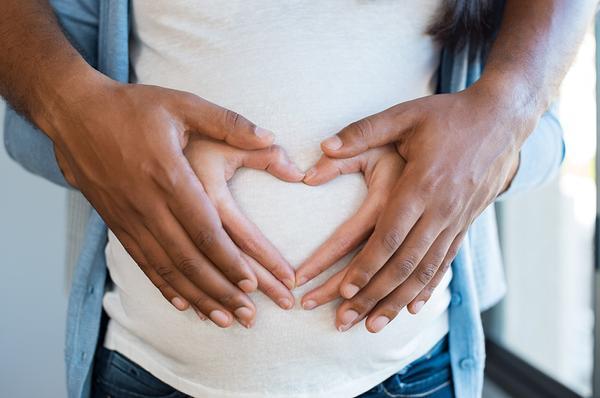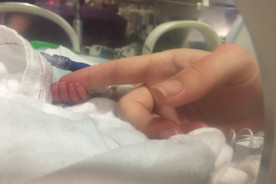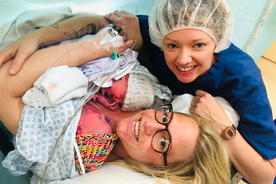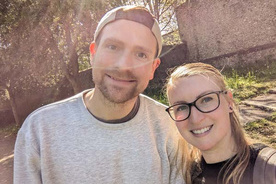2 March 2023
Enduring an IVF battle as a couple is a huge test on any relationship and leads to a rollercoaster of emotions.
One twin dad has anonymously shared his story of infertility, in the hope of helping other men going through the same journey to parenthood.
He talks about his fears about bonding with his twins and what he did to help himself, and his wife, through the process.
“It has taken me more than 25 years to write this down and unpack my feelings, which have been bottled up inside me far too long.
I enjoyed PE at primary school, but as I got towards my teenage years, I found more and more reasons to avoid it. Having gone through puberty, I realised I was different to other boys, having had a testicle removed as a baby and the other one not forming properly. This made me very self-conscious and I never wanted to take part in PE. In my day, at the end of each PE lesson the boys all had to take communal showers. I was always terrified of others noticing the difference – something that I was very conscious of and anxious about. Thankfully, my secret never did come out at school, but the anxiety never went away, but was never talked about either. It is something that I was told my siblings didn’t know about, I was assured by mum and dad that only we three knew.
Ever since going through puberty, the obvious questions I had included “Would I be able to have children?”, and “When do I explain things to anyone I was in a relationship with?” and the biggest question of all… “Would a woman want a relationship with me if I couldn’t have children?” These questions played on my mind a great deal, but I never shared - mainly because of the embarrassment. Reflecting now, it’s hard to know if I would have benefitted from professional counselling, but I certainly think if it was offered routinely via medical practitioners who knew my history, I would have been accepting of the support.
My parents reassured me that I would be able to have children one day but we never went into the mechanics of how, and exactly what they meant by that – IVF was at such early stages at that time. All I knew in my own heart, was that there was every chance I would have difficulties, and it could be a problem.
Whilst I had been able to cope at school, those anxieties and worries I mentioned came flooding back as I met a lovely girl in my twenties, whom I wanted to marry. All those questions started coming back to the forefront of my mind.
We then got engaged, I remember talking to her about my concerns in having children, which was again a really difficult conversation but I knew I had to be honest about with her about the challenges we could face before marriage. It was a really hard conversation for me, and one I agonised over for weeks over what to say and when to say, it as I was worried about her response and the possibility of rejection from someone I loved.
We didn't want children straight away, which was a personal relief, but it also prolonged my anxiety, as the inability to do so was my biggest fear.
I still felt a huge burden on my shoulders, and a worry I couldn't give my wife the one gift any husband or partner wants to give – the gift of children
I appreciate I had lived with this fear all my life, but I also reflect on the emotions and feelings for those men who only at this stage find out they are not able to have children… the shock, confusion and sadness they must feel, along with a real sense of shame too.
As we decided to try and start a family, my fears became a reality as we were unable to get pregnant naturally. Whilst my wife slept, I spent many, many nights awake with what I can only describe as a deep inner sadness, longing for the gift of children (my own biological child), and researching alternative options. We both knew the reason she wasn’t getting pregnant, and I felt ashamed, and a complete failure and a sadness that to some extent still lives in me today.
We looked into IVF, and decided to pursue that option. I remember so clearly calling both sets of parents to update them on our decision. We didn’t have to tell family, but equally felt it important that my wife’s family heard from myself the reasons for this. Making that call was so hard, feeling a sense of humiliation and sadness – although they were gracious and really supportive.
We were expedited through the IVF hurdles because of my medical history, but even then, I had to go through a process of checking to see if I was fertile. This was an awful process as it simply re-confirmed what I already suspected, and made a reality of my worst fears.
As part of the IVF process, we were offered one counselling session. I remember to this day questioning how much to share. So, I didn't dare share any of my true feelings, as I was so worried it may delay or prevent us going ahead through the process. I didn’t want to do anything to jeopardize the opportunity to have a family, so I just kept it to myself. I also didn't want to burden others. But in reality, I was worried about how I would both feel about the child and be able to bond with it.
The wait to see if the first cycle had worked was unbearable
The wait to see if the first cycle had worked was unbearable – when we found out it hadn’t, I have never felt so much personal guilt for the emotions my wife was feeling and the process she was having to through. All those injections, drugs and invasive procedures.... all because I couldn’t give her what she wanted. So often infertility support is focused on the woman, along with the support throughout the IVF process. Whilst I absolutely know this is needed, I also believe the men are often forgotten about, or like myself, find it hard to open up about the impact of infertility and IVF on themselves.
I remember and cherish the time when my wife confirmed she was pregnant, although I pondered privately with some anguish for nine months about how I would bond with twins who were not biologically mine. How would I feel about them, and how would I respond to questions that naturally arose about parentage and heritage. “Don’t they look like their mother?”, or “Where do they get those eyes from?”

After they were born, I admit that I did struggle to bond at the beginning, partly because they were premature, and so much of their care was being provided by an amazing nursing team. My anxiety got the better of me at times, but those feelings faded after a while as I spent more time with the children and getting to know each of their special personalities, despite them being so small and fragile. I guess on reflection, only having a short amount of paternity leave and with a huge amount of focus on their mother, I did at times feel as if I was a spare part… it took quite some time for me to adjust.
We are now 11 years on, and since the children came into our lives I have learned to live with my infertility. My full story is something I haven’t unpacked or ever shared to this date, and I have just focused so much love towards our children. I love them dearly, they are my motivation to be my best every day, and would do anything for them, but there will always remain a deep-rooted sadness that I couldn’t have my own biological children.
Despite the early challenges of this journey to parenthood, by far the hardest part of this journey for me personally was last year, when we felt it was time to share with our children about their IVF origins. Although we prepared for this conversation with some brilliant support from the Donor Conception Network, not knowing how the children would respond made this process so hard.
Why am I sharing this story now? It is because an estimated 7% of all men are affected by infertility. Approximately 30% of fertility problems are due to the man, 30% due to the woman and 30-40% are due to both or unknown reasons. However, despite these facts, much of the support available is geared towards women, and I personally believe men find it so much harder to talk about or seek the support they would benefit from – I was one of those men.
We need to find ways to reach out and support men who are affected, raise awareness of organisations that offer support, such as HIMfertility and remove stereotypes and barriers, enabling both men and women to be comfortable talking about their infertility.”
-strap.svg)



